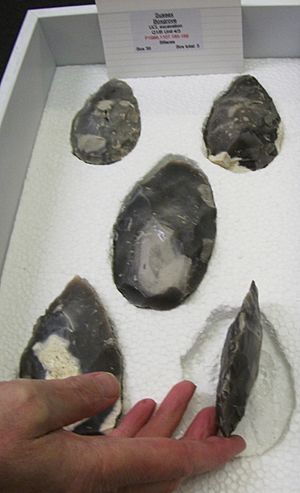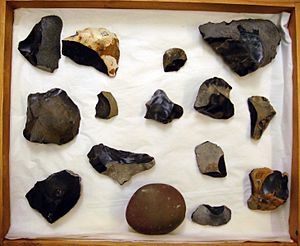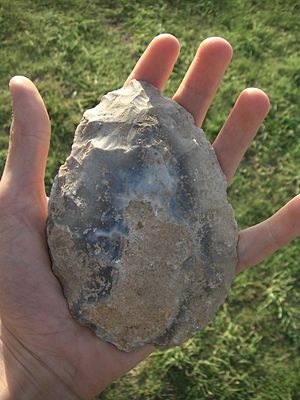Boxgrove quarry facts for kids

Boxgrove Quarry is a very important archaeological site in West Sussex, England. It used to be a place where people dug up gravel, but now it's famous for showing us how early humans lived. This site is from the Paleolithic Age, which means it's incredibly old! It's also a Site of Special Scientific Interest, meaning it's protected because of its unique scientific value.
When archaeologists started digging here in 1983, they found flint tools that were 500,000 years old. Back then, these were the oldest signs of humans ever found in the UK. Later, even older tools were found in other places like Pakefield (700,000 years old) and Happisburgh (at least 800,000 years old). But Boxgrove is still super important for many reasons. The tools found here were in their original spots, just as they were left half a million years ago. This means they were found in situ, undisturbed in their ancient landscape. These tools and clues about the old landscape were buried several metres deep.
Archaeologists also found many well-preserved animal bones and lots of flint artifacts. They even found bones from early humans, called hominid bones, which are some of the oldest found in Europe. Some of the animal bones are the oldest ever found for their species. For example, a wing bone from a Great auk was found here in 1989. All these discoveries – the bones, the stone tools, and the geology (the study of the Earth's layers) – give us a very clear picture of what this coastal area looked like half a million years ago.
Teams led by Mark Roberts from the Institute of Archaeology, University College London, dug at parts of the site between 1983 and 1996. The area had a buried chalk cliff that looked out over a flat beach. This beach stretched about one kilometre south to the sea and included a waterhole.
Boxgrove Man: Early Human Discoveries
In 1994, archaeologists made an exciting discovery at Boxgrove Quarry. They found a lower leg bone, called a tibia, from an early human. This partial leg bone is between 478,000 and 524,000 years old! They also found several teeth. These remains belonged to Homo heidelbergensis, an early human species that lived in places like France and Great Britain. At that time, France and Great Britain were connected by a land bridge, making it easier for these early humans to travel between them.



